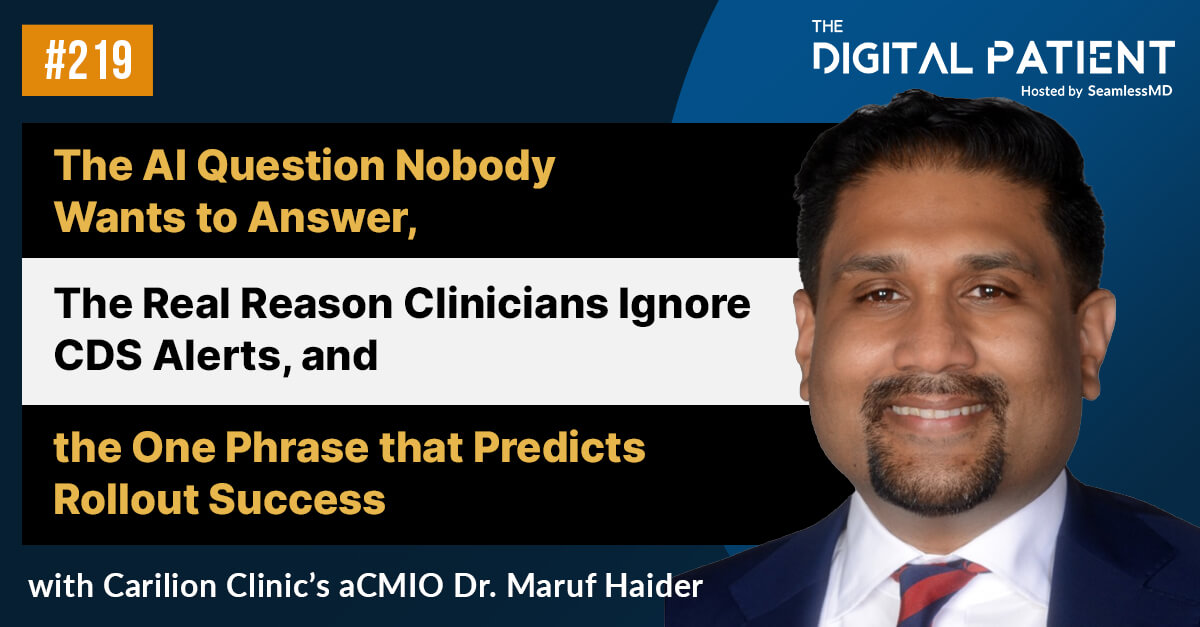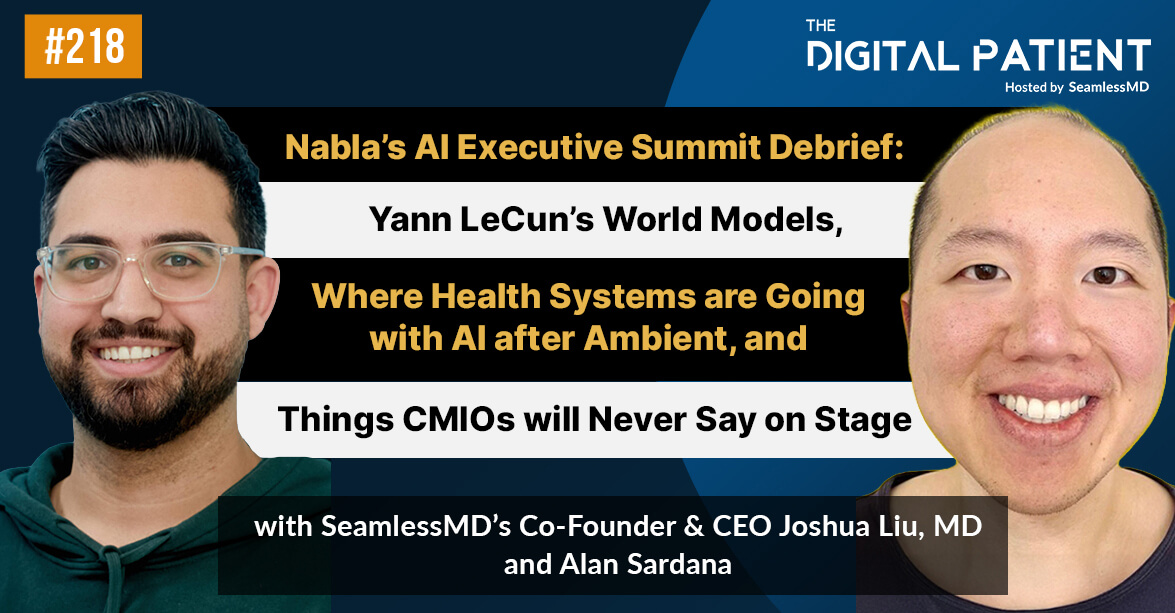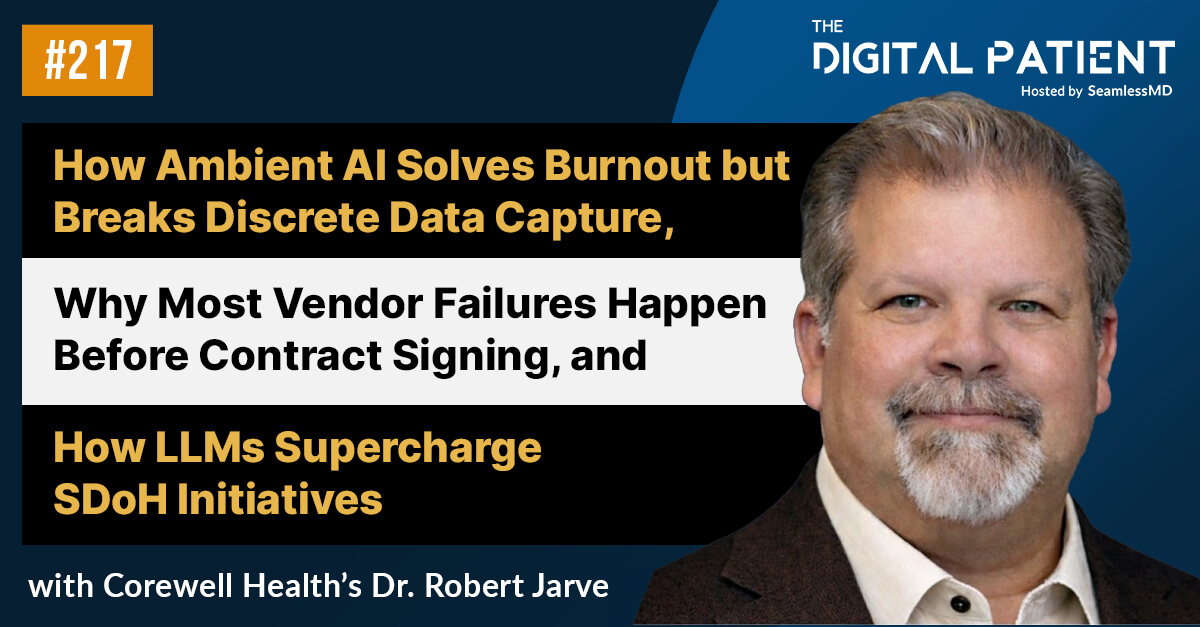Subscribe on: RSS | SPOTIFY | APPLE PODCAST | GOOGLE | BREAKER | ANCHOR
On this episode of "The Digital Patient" podcast, hosts Alan Sardana & Dr. Joshua Liu speak with Dr. Margaret Lozovatsky, Chief Health Informatics Officer at Novant Health, about "How to Build the Right Culture for Digital Transformation, Connecting Technology with Clinician Needs, Engaging Physician Skeptics, and more..." Click the play button to listen or read the show notes below.
Audio:
Video:
Guest(s):
- Dr. Margaret Lozovatsky (@DoctorLozo), Chief Health Informatics Officer and Senior Vice President at Novant Health
- Dr. Joshua Liu (@joshuapliu), Co-founder & CEO at SeamlessMD
Episode 97 - Show Notes:
[00:00] Introducing Dr. Margaret Lozovatsky, Chief Health Informatics Officer at Novant Health;
[01:22] Why Dr. Lozovatsky completed a computer science degree before going to medical school and becoming a pediatrician to gain a background in something different than what she would focus on for the rest of her career;
[03:24] How EHR implementation during her residency led to her becoming the go-to person for troubleshooting, and eventually she found herself back in healthcare technology;
[04:13] How Dr. Lozovatsky knew she wanted to be a pediatrician from the beginning of medical school, why pediatrics is unique regarding technology access, and how pediatric centers face complexity both in terms of medical tools and patient relationships, particularly during the transition from pediatric to adult care;
[08:53] Why Dr. Lozovatsky ties strategies back to patient care so that everyone can rally behind the same goal, and how with the increasing stress on clinicians, the need to take some of the burdens away from them with technology is becoming more crucial;
[11:10] How job seekers are now considering the quality of EHR implementation, workflows, and technology expectations before taking up new roles, and the use of electronic medical records will continue to be an important consideration in the healthcare industry;
[13:07] Why Dr. Lozovatsky believes modern EMRs have created long-term challenges as they were originally created as a digital replacement for traditional paper charting, and why she believes it’s important to rethink the purpose of clinical documentation and train physicians on effective documentation habits;
[16:12] Why Dr. Lozovatsky stresses the importance of asking questions and simplifying problems to drive innovation, and how innovation should be connected to the clinical needs of patients and clinicians to avoid creating new problems instead of solving them;
[19:58] Why Dr. Lozovatsky believes it is essential to involve end-users and leaders in the design process to understand their priorities and challenges, and how governance structures that engage people in charge of specific areas can help organizations be more nimble;;
[23:09] How Novant Health was able to quickly implement their telemedicine platform during the pandemic because they had the necessary infrastructure in place due to their forward-thinking approach, despite initial hesitation from patients and physicians;
[25:46] Why Dr. Lozovatsky is transparent about sharing information around potential barriers and challenges that will come with new initiatives as it helps to alleviate fear and encourage people to try new things;
[30:16] Why Dr. Lozovatsky includes skeptical physicians in governance bodies as she believes having forward-thinking champions who are willing to try new things are essential for innovation, but those who are hesitant to participate often provide the best feedback and highlight considerations the team potentially had not considered;
[32:25] Why Dr. Lozovatsky is excited about the future of personalized access to care;
Fast 5 / Lightning Round:
- What is your favorite book or book you’ve gifted the most?
"How to Win Friends and Influence People” by Dale Carnegie
- Who is a person–dead or alive–you’d love to meet?
"Golda Meir”
- Would you rather have Super strength, super speed, or the ability to read people’s minds?
"Mind reading”
- What is something in healthcare you believe that others might find insane?
“I don’t think the average person realizes the amount of things that a physician is balancing in a day.”
- If you could travel back in time to any event or moment, what would it be and why?
"I would love to go back and watch some moments in my childhood as an adult… A lot of times you miss the context of what's happening because you're a small child, and you also missed a lot of the valuable insights that your parents & grandparents were trying to communicate to you."
.svg)










.png)
